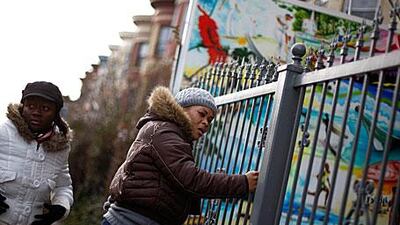NEW YORK // "We will not forsake you. We will not forget you," Barack Obama, the US president, said yesterday as his administration announced the dispatch of troops and aid to help the beleaguered people of Haiti. The United States, which is home to the largest concentration of Haitians outside Port-au-Prince and has a long history of involvement in the Caribbean island, tried to pull together amid early criticism that television journalists seemed to be the first to arrive in Haiti ahead of US emergency aid personnel.
From the United Nations headquarters in Manhattan to the "Little Haiti" enclave in Brooklyn where around 100,000 Haitians live, people worriedly waited for news of colleagues and loved ones. The fate of around 200 UN workers remained unknown and the mood was subdued at their East River headquarters while the UN flag flew at half-mast outside. Thousands of Haitians, meanwhile, were left repeat dialling on the telephone in a futile effort to reach relatives.
"This is a tragedy for the United Nations as well as the Haitian people," said Elisabeth Byrs, spokeswoman for the UN Office for the Coordination of Humanitarian Affairs. "The priority is to save lives, get people out of the rubble and treat the wounded. Every hour counts." The Haitian Red Cross released the first death estimate by a relief organisation - between 45,000 and 50,000 - as Mr Obama announced US$100 million (Dh367m) in aid and described Haiti's plight as "truly heart-wrenching" and made worse by its long history of suffering.
"You have endured a history of slavery and struggle, of natural disaster and recovery. And through it all, your spirit has been unbroken and your faith has been unwavering," he said. "So today, you must know that help is arriving. Much, much more help is on the way." US commentators pointed out that Mr Obama would be unwilling to risk accusations of weakness that so hobbled George W Bush, his predecessor, after the Katrina hurricane in New Orleans and the Asian tsunami in 2004. The Obama administration also said it was making efforts to track some 45,000 US citizens in Haiti.
A first group of around 100 soldiers from the US Army's 82nd Airborne Division were expected to arrive in Haiti last night to set up tents and other logistics for another 800 expected today. Another group of 2,200 marines were also set to be dispatched along with more than half a dozen military ships. "This calamity has affected three million people. It has caused the collapse of tens of thousands of buildings. We know that there will be tens of thousands of casualties," Hillary Clinton, the secretary of state, told NBC television after cancelling a trip to Asia.
Efforts were also made to ease the plight of Haitians away from the disaster zone, with the United States announcing it would suspend deportations of illegal immigrants. Some 30,000 Haitians face deportation orders but Janet Napolitano, the homeland security secretary, said such orders would be halted "for the time being". Since Haiti was hit by four devastating storms in 2008, groups have been calling for "temporary protected status" to allow Haitians to work and send money back home for an extended period.
The Obama administration, along with that of Mr Bush, so far has denied granting temporary protected status, which applies to other countries facing natural disasters such as El Salvador and Somalia. France also said it had stopped expelling illegal immigrants but did not say for how long the suspension would last. Tens of thousands of Haitians are estimated to live in France. Many countries around the world dispatched relief teams and announced aid as UN officials in New York said heavy equipment, search personnel and medical teams were urgently needed.
The Haitian diaspora in New York was urged to think beyond efforts such as collecting food and clothing and to consider volunteering in the country. "Think beyond the short term and expect to take trips to Haiti to provide on the ground help," Jocelyn McCalla, who works with Haiti's senior adviser to the UN, told The New York Times. "Haitians should be rolling up their sleeves and committing some part of their jobs. Haiti will be facing storms like clockwork. They should be volunteering to provide support and expertise."
@Email:sdevi@thenational.ae

